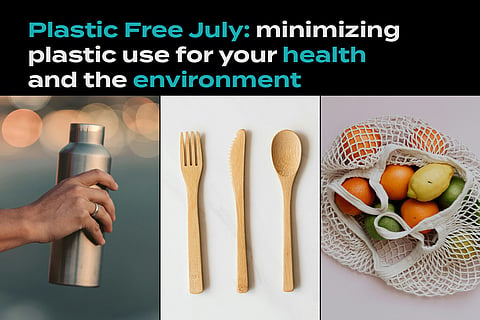Bridging the Gap - Health Equity for all
How Plastic-Free Could You Be This July?
<p>Every year, millions of people around the globe participate in Plastic Free July, a month-long campaign aimed at raising awareness about the impact of plastic pollution and encouraging individuals to reduce their plastic consumption. Plastic threatens both the health of humans and the planet, which we are dependent upon for a reliable and clean food supply.</p>
<p>Understanding the effects of plastic on our planet, health, and economy highlights the importance of initiatives like Plastic Free July.</p>
<h2>Environmental impact of plastic</h2>
<h3>Marine life and ocean health </h3>
<p>Marine ecosystems are under threat from plastic pollution. Millions and millions of tons of plastic enter the ocean every year, and animals like turtles, seabirds, and fish mistake the debris for food, leading to ingestion and often death. </p>
<p>As plastics break down into ever smaller parts, they become microplastics, and these tiny particles seep into marine food webs, posing risks to both wildlife and humans who consume seafood. </p>
<figure><img src="https://cdn.storymd.com/optimized/lqLeayIKAX/original.png" alt="Plastics in the Ocean Infographic | Source: NOAA’s Marine Debris Program (MDP)" />
<figcaption>Plastics in the Ocean Infographic. <em>Source: NOAA’s Marine Debris Program (MDP)</em></figcaption>
</figure>
<h3>Land pollution and wildlife</h3>
<p>Plastic is a disaster at sea and on land. As our plastic waste clutters landscapes, land animals become entangled in it or eat it, causing injury or death. Plastics also add to soil degradation, affecting plant growth and agricultural productivity.</p>
<h3>Greenhouse gas emissions</h3>
<p>Both the production and disposal of plastic contribute to greenhouse gas emissions. We derive plastics from fossil fuels, and the manufacturing process takes up a lot of energy. When plastic is incinerated, it emits carbon dioxide and other harmful gases into the atmosphere. </p>
<h2>Effects of plastic on human health </h2>
<h3>Chemical exposure</h3>
<p>Inside plastics are hazardous chemicals such as bisphenol A (BPA) and phthalates that leach into food and beverages from packaging. These chemicals are suspected of disrupting endocrine function and are linked to health issues such as reproductive problems, metabolic disorders, and cancer.</p>
<h3>Microplastics in food and water</h3>
<p>Bottled water and all sorts of food products have tested positive for the presence of microplastics. The health effects of these particles continue to be studied, but it’s not looking good. Early research suggests that they can cause damage to cells and tissues and may trigger inflammation.</p>
<p>Microplastics may also be carriers of other toxic substances, like heavy metals and other pollutants. This could lead to additional health risks including cancer and endocrine disruption.</p>
<figure><img src="https://cdn.storymd.com/optimized/Xdbxa7F0AB/original.png" alt="Microplastics on National Park Beaches Infographic | Source: NOAA" height="1000" />
<figcaption>Microplastics on National Park Beaches Infographic. <em>Source: NOAA</em></figcaption>
</figure>
<h2>Economic impact</h2>
<p>Plastic pollution costs governments and communities billions of dollars in cleaning fees. Huge amounts of money are spent on clearing our streets, parks, beaches, and oceans of plastic when it could be better spent on education, healthcare, and other vital services.</p>
<p>Plastic pollution hurts the fishing industry through the loss of marine life and contamination of fish stocks. Poorer yields and productivity hurt the agriculture industry as well. </p>
<h2>Plastic Free July</h2>
<p>The idea behind Plastic Free July is to get us to rethink our lives in a way that minimizes plastic use, empowering individuals to make a difference. Simple actions like refusing single-use plastics and using reusable bags, bottles, and straws can collectively make a substantial impact on reducing plastic waste. </p>
<p>Plastic Free July is also about sparking conversation. It encourages governments and businesses to adopt more sustainable practices, such as banning single-use plastics and investing in recycling technologies. As a consumer, you can choose companies that prioritize sustainability and drive market demand for eco-friendly products.</p>
<figure><img src="https://cdn.storymd.com/optimized/2dZNBnfjdG/thumbnail.png" alt="Ten Ways to Unpackage Your Life | Source: Environmental Protection Agency (EPA)" />
<figcaption>Ten Ways to Unpackage Your Life. <em>Source: Environmental Protection Agency (EPA)</em></figcaption>
</figure>
<h2>Reducing your exposure to microplastics</h2>
<p>We’ve found microplastics at the top of Everest and in the placentas of unborn babies. In other words, you can’t hide from them completely, but you can reduce your exposure. Some tips include:</p>
<ul>
<li><strong><strong>Opt for high-quality filtered water. </strong></strong>Plastic water bottles are significant sources of microplastics. Invest in a water filter for your home faucet that can remove microplastics, and use a reusable container instead.<strong><br /><br /></strong></li>
<li><strong>Minimize processed food. </strong>It’s terrible for you anyway, and it often comes in packaging that sheds microplastics. Where possible, choose fresh, whole foods that are less likely to be contaminated, and rinse them to remove microplastics that may have accumulated on their surfaces.<br /><br /></li>
<li><strong>Avoid plastic packaging. </strong>Food items packaged in glass, metal, or paper are a better choice, so opt for these alternatives where possible. <br /><br /></li>
<li><strong><strong>Kitchenware. </strong></strong>Avoid plastic utensils and nonstick pans. Store food in glass or stainless-steel containers. </li>
</ul><h2>More on Plastic Pollution</h2><ul><li><a href="https://soulivity.storymd.com/journal/mr7xb46hzj-plastic-pollution" target="_blank">Plastic Pollution: A Guide to Plastic in the Ocean</a></li><li><a href="https://soulivity.storymd.com/journal/wx4x55qhzm-bisphenol-a" target="_blank">Bisphenol A (BPA): Health Effects and Its Use in Food Packaging</a></li><li><a href="https://soulivity.storymd.com/journal/yj59eg6fnw-reduce-reuse-recycle" target="_blank">Reduce, Reuse, Recycle: The Three R's of Waste Management</a></li></ul>


